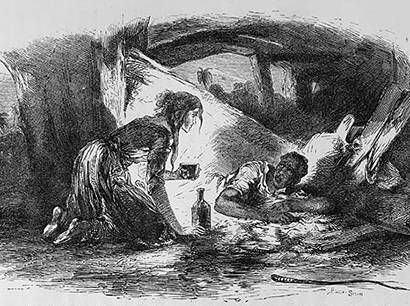This Week's Story
subscribe to podcast [click here] or play audio below
Uncle Tom is stripped of life, liberty, and the pursuit of happiness. He lives in a book blockbuster.

This Week’s Story relives American history and the Bible through brief inspiring stories presented on mp3 audio recordings and text for reading.
For Sale!!
At 12:01 A.M. on July 21st of 2007 Harry Potter and the Deathly Hallows was released and became the fastest selling book in history. Presently 450 million copies of books from the Harry Potter series have sold worldwide.
Canterbury Tales by Geoffrey Chaucer has been another blockbuster. One first edition copy of it sold for 7.5 million dollars in 1998. Written over 600 years ago in England it is read today by high school and university students. When translated well into contemporary language, readers are surprised with its humor and mirror of corruption and honor.
Uncle Tom’s Cabin by Harriet Beecher Stowe was released in 1852 and became a best seller in the United States, Britain, and Europe. Within a year 1.2 million copies sold in Great Britain. It was a publishing phenomenon.
These books have had massive influence. A frequent claim is that the Harry Potter books have turned millions of young people into readers. G.K. Chesterton wrote that Chaucer’s writing “came very near to making a nation.” Uncle Tom’s Cabin affected what a nation of Americans believed about slavery.
Harriet Beecher Stowe’s Uncle Tom’s Cabin is less known now, but its message was for 1852 and for the present. It is to feel, if only through secondhand experience, the pain of slavery and bring it to an end. Slavery is becoming epidemic today and in 1852 it was bringing the United States close to Civil War.
Harriet wanted readers to know the horrors of slavery. Her sister had written to her, “…if I could use a pen as you can, I could write something which would make this whole nation feel what an accursed thing slavery is.”
Harriet wrote from experience before the Civil War. Living in Cincinatti, Ohio she witnessed a mob wrecking the printing press of an antislavery newspaper. Her husband and brother rescued her free black maid from kidnappers, who were going to sell her back into slavery.
From her home she heard what she knew to be a white mob turn on a black community with torches, guns, and cannon. Harriet saw fires and heard the cries of women whose children were being taken from them. In the chaos black children were stolen to be sold into slavery.
Harriet was outraged when the United States Congress passed a stricter Fugitive Slave Law, which applied to northern and southern states. This law required that everyone, whether a policeman or an ordinary citizen, help capture slaves trying to escape to freedom. Those who refused to help slave-catchers or who helped fugitives, could be fined and jailed.
What Harriet saw and heard pushed her into doing what she could do. She began hiding runaways in her home and writing for antislavery publications. In church one Sunday she was waiting to take Communion when she imagined a scene. She saw a white-haired old black slave on the ground. He was being beaten and asked to tell where escaped slaves had gone. As he lay there, he refused to give information. His lips moved as he prayed for the two slaves who were being forced to beat him.
When Harriet got home from church, she wrote down the scene. A month later her husband found the writing and told her, “Hattie, you must go on with it. You must make up a story with this for the climax. The Lord intends it so.” With his encouragement she wrote more scenes, interviewed many former slaves, and researched many published first-hand accounts. Finally she realized that she could write a full-length novel, which became Uncle Tom’s Cabin.
This is Barbara Steiner, thankful for changes stories have made in me.
<< previous story] [next story >>
We invite your comments! [click here to comment]
This Week's Story is a non-profit supported by listeners. [click here to make a donation]
